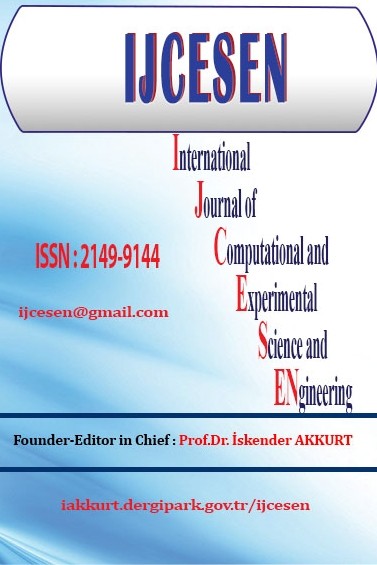Separation of Copper and Zinc from aqueous solution using Liquid-Membrane-Gel (LMG) containing Trioctylphosphine Oxide TOPO as Carrier
Separation of Copper and Zinc from aqueous solution using Liquid-Membrane-Gel (LMG) containing Trioctylphosphine Oxide TOPO as Carrier
Liquid-membrane-gel, copper,
___
- [1] N. Taoualit, D. E. Hadj-Boussaad. Metallic species (Ag+ and Cu2+) transfert through a membrane-gel, Desalination 144 (2002) 273-277. DOI: 10.1016/S0011-9164(02)00327-2 [2] N. Taoualit, D.E. Hadj-Boussaad. Transport of silver metal ions through a liquid membrane gel using a solvating extractant (TOPO). Desalination 193 (2006), 321–326. DOI:10.1016/j.desal.2005.08.025 [3] E.H. Rifi, Extraction métallique par des gels hydrophobes, Doctoral thesis, Louis Pasteur University, Strasbourg, France, 1988. [4] Organisation mondiale de la santé. Traces elements in human nutrition; a report of a WHO Expert Committee. WHO Technical Report Series 532, Genève. P. 70 (1973). [5] G. Leóna, M. A. Guzmánb. Facilitated transport of copper through bulk liquid membranes containing different carriers: compared kinetic study, Desalination 223 (2008) 330–336. DOI:10.1016/j.desal.2007.01.216 [6] Association Toxicologie-Chimie MDA 10 206 quai de Valmy, 75010 paris http://atctoxicologie.free.fr [7] M. Kermiche, S. Djerad. Facilitated transport of copper through bulk liquid membrane containing di-2ethylhexyl phosphoric acid, Desalination and Water Treatment 36 (1-3) (2011) 261-269. [8] F.J. Alguacil, M. Alonso. Transport of Au(CN)2− across a supported liquid membrane using mixtures of amine Primene JMT and phosphine oxide Cyanex 923 Hydrometallurgy, Volume 74, Issues 1–2 (2004) 157–163. DOI:10.1016/j.hydromet.2004.03.001 [9] D.K. Hale. National Research Development Corp., British Patent (Oct. 12, 1955) Br. 738, 500. [10] H. Small. The Dow Chemical Company, U.S Patent, 3, 102, 782 (Sept. 3, 1963). [11] A.N. Zelikman, L.V. Myakisheva, L.A. L'Nskaya, E.A. Baibekova, Yu.F. Korovin and V.K. Myasnikov. Tsvent. Met. (Moscow), 3 (1990) 74-78. [12] K. Shakir, M. Aziz and S.G. Beheir. Hydrometallurgy 31 (1-2) (1992) 41-54. [13] T. Braun and A.B. Farag. Talanta 22 (1975) 699. [14] S. Torok, T. Braun, P. Van Dyck and R. Van Grieken. X-Ray Spectrometry 15 (1986) 7. [15] T. Braun and A.B. Farag. Anal. Chem. Acta 76 1975) 107. [16] T. Braun and S. Palagyi. Anal. Chem. 51 (1979) 1697. [17] T. Braun and M.N. Abbas. Anal. Chim. Acta 131 (1981) 311. [18] M.N. Abbas, A. Vertes and T. Braun. Radiochem. Radioanal. Letters, 54, 17 (1982). [19] T. Braun and M.N. Abbas. Anal. Chim. Acta 160 (1984) 277. [20] H.D. Gesser, and S. Ahmed. J. Radioanal. Nucl. Chem. 140 (2) (1990) 395-408. [21] A. Bachai, H.J.M. Bowen. Analyst 101 (1976) 661. [22] N. Taoualit, I. Abidet, and D.E. Hadj-Boussaad. Extraction of copper and zinc by liquid-membrane-gel. Matec web of conferences 3 01065 (2013). DOI: 10.1051/matecconf /20130301065 [23] T. Yano, S. Ide, Y. Tobeta, Kobayachi, Ueno H., K. Talanta 23 (1975) 457. [24] DE. A. K Kouphar, S.M, Chalmers R.A, Solvent extraction of metals», Van Nostand Reinhold company (1970). [25] L. Hatinger. Guide d’analyse des eaux de traitements de rejets de traitements de surfaces, CETIM (1990). [26] N. Taoualit. Contribution à l’étude de l’extraction liquide-gel de l’argent. Masters Thesis, University of Blida, Algeria, 1999. [27] C. Zidi, R. Tayeb, M. Dhahbi. Comparison between facilitated transport through a Supported Liquid Membrane (SLM) of phenol and vanillin extracted from aqueous solutions. J. Mater. Environ. Sci. 5 (3) (2014) 779-782. [28] I. Ait-Khaldoune. Optimisation du transport des cations Cu(II), Zn(II) et Cd(II) par le tri-n-butylphosphate (TBP) à travers les membranes d’affinité. Magister thesis, of Tizi-Ouzou University, Algérie 2011, [29] X. Yang, H. Duan, D. Shi, R. Yang, S. Wang, H. Guo. Facilitated transport of phenol through supported liquid membrane containing bis(2-ethylhexyl) sulfoxide (BESO) as the carrier. Chemical Engineering and Processing 93 (2015) 79–86. DOI: 10.1016/j.cep. 2015.05.003 [30] X. Yang, A. Zou, J. Qiu, S. Wang and H. Guo. Phenol Removal from Aqueous System by Bis(2-ethylhexyl) Sulfoxide Extraction. Separation Science and Technology Volume 49 (2014) - Issue 16. DOI: 10.1080/01496395.2014.937497
- Yayın Aralığı: 4
- Başlangıç: 2015
- Yayıncı: Prof.Dr. İskender Akkurt
Experimental Study for the Energy Levels of Europium by the Clinic LINAC
Nilgün DEMİR, Ayşe KIVRAK, Mahmut ÜSTÜN, Alp CESUR, İsmail BOZTOSUN
Open-Hole Tensile Experiments of Thermoplastic Composite Laminates and Finite Element Analysis
Hakkı ÖZER, Orhan KURTULUŞ, Harun GÜÇLÜ, Mustafa TAŞ, Murat YAZICI
Effect of Kaolinite Mass Ratio on Compressive Strength of Kaolinite-Calcite Based Geopolymer
Experimental Investigation of a Novel Condensing Boiler
Investigation of notch effect on vibration behavior of filled and unfilled composite beam
Nadjet TAOUALIT, İsmail ABIDAT, Djamal-eddine HADJ-BOUSSAAD
Response Surface Based Optimization of Aerodynamic Performance of a Horizontal Axis Wind Turbine
Design of low power DTMOS based FCS and its notch filter application for ECG signals
